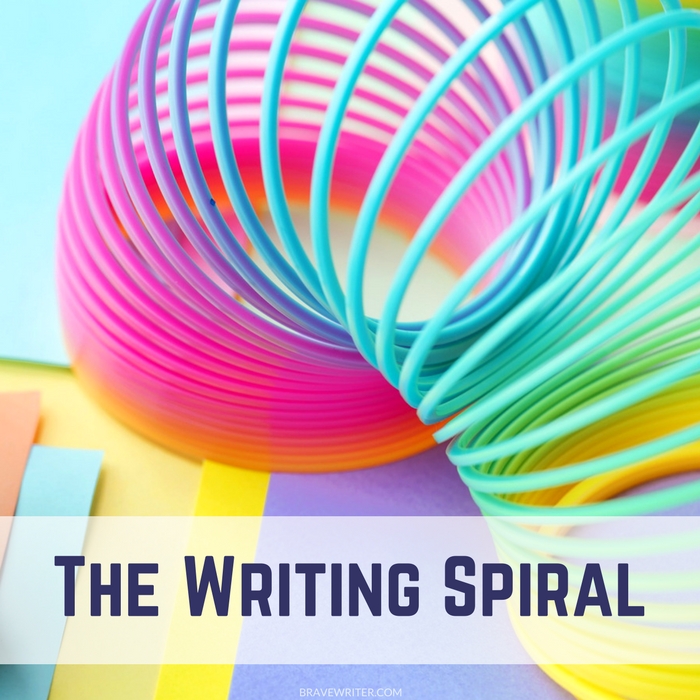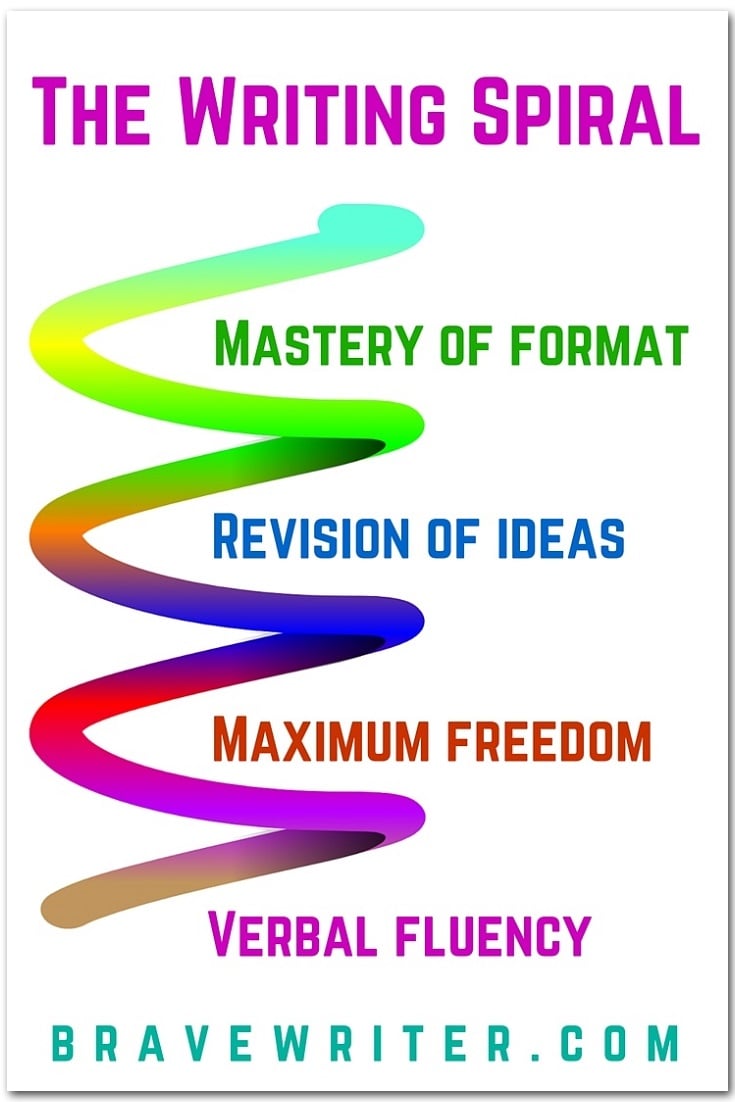Writing Advice: The Spiraling Approach

I’m about to lay on you some high quality, free-of-charge writing advice. Take it. Apply it. Share it.
I wish I could get this message out to everyone who teaches writing. It would change the landscape of how many gifted, competent, satisfied, brave writers there are in the world. You are on the front lines and can make all the difference for your kids.
Apply a spiraling strategy to writing growth.
The strategy for growth in writing needs to go like this:
- Verbal fluency in the vocabulary of that level
- Maximum freedom to explore that topic/subject area in writing (no structure, no rules, no disapproval for spelling errors, grammar inaccuracies, missing punctuation, and disorganization)
- Revision of ideas and the introduction of structure
- Mastery of format for that developmental stage of growth
KEY INSIGHT: This sequence starts again when your child goes up a level.
So for the beginning writer, we start with speech, jotting down the child’s thoughts, and then reading them back. We may ask a child to copy their own thoughts in their own hand from a model we make for them. But mostly, they talk, we write.
For the growing writer, we introduce freewriting. A child takes the unedited scrap language in his or her mind and transfers it to a page without worry about spelling, grammar, handwriting, or punctuation. Once comfortable with freewriting, we introduce some of the strategies of revision. We revise content for ideas, insights, better vocabulary, higher quality images and comparisons, without attention to specific formats. Conversation, freewriting, revision, polishing all happen on a regular basis but no one is expecting an argumentative essay out of the process.
The proficient writer will still use conversation and freewriting to express new ideas onto the page, but the vocabulary deepens. Now the formats are more structured: a report, or lapbook. A poem, or narration. Each of these will begin with freewriting, but then the forms are easily taught to this writer.
 When you move to the academic writing of high school, it almost feels like a regression. While the child develops a literary, rhetorical vocabulary, it helps to go back to freedom for risk taking. In Brave Writer, for instance, we offer the Boomerang Book Club as a way to write about literature without attention to form. In these written responses to discussion questions, students learn to put their thoughts about novels into writing without the added pressure of writing a literary analysis essay…yet.
When you move to the academic writing of high school, it almost feels like a regression. While the child develops a literary, rhetorical vocabulary, it helps to go back to freedom for risk taking. In Brave Writer, for instance, we offer the Boomerang Book Club as a way to write about literature without attention to form. In these written responses to discussion questions, students learn to put their thoughts about novels into writing without the added pressure of writing a literary analysis essay…yet.
After many months of this practice, students are finally ready to add the format called the essay. They find it easy to access the language within because they’ve been doing it freely for many months. They find that they are “fluent” in the material that goes into the format and aren’t having to fire on both cylinders from the get go. They have this wonderful head start: written vocabulary in the field for the format.
You can’t expect your student to jump from writing little reports to a literary response or expository essay just because the student can type or handwrite. Until the student has developed a vocabulary in writing for that level of reflection, the writer won’t be comfortable transferring the thoughts in his mind down through his arm into his keyboard. Each advance in intellectual development requires a period of free, written exploration before introducing formats. That written exploration has to be over a period of time (not just one freewrite) so that the child/teen becomes comfortable with accessing this new category of vocabulary in writing.
Do not see it as “going backwards” to give a student a chance to write with no agenda whatsoever about the topic at hand, whatever that new topic may be.
Our Help for High School manual and Essay Prep online courses are designed for this kind of written exploration that precedes the essay. The Boomerang Book Club does the same thing for literature.
Remember this progression:
- Oral development
- Written free exploration
- Revision techniques (for ideas and content generation)
- Formats
Follow these four steps each time your child moves up one rung of the natural stages of growth in writing ladder. If you take seriously the period of written exploration, teaching the format that follows will be a breeze. Skip it, and you risk introducing writer’s block at that new developmental stage.
UPDATED: Here’s a talk I did about The Writing Spiral!

















